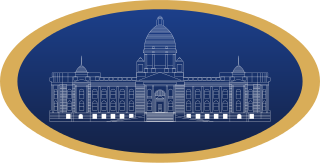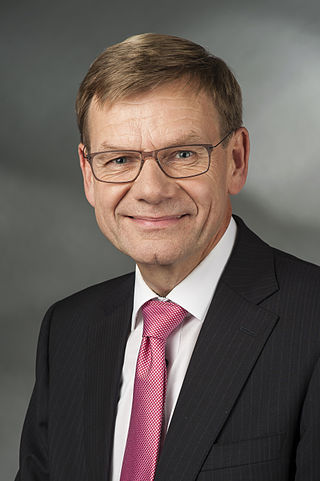A member of parliament (MP) is the representative in parliament of the people who live in their electoral district. In many countries with bicameral parliaments, this term refers only to members of the lower house since upper house members often have a different title. The terms congressman/congresswoman or deputy are equivalent terms used in other jurisdictions. The term parliamentarian is also sometimes used for members of parliament, but this may also be used to refer to unelected government officials with specific roles in a parliament and other expert advisers on parliamentary procedure such as the Senate parliamentarian in the United States. The term is also used to the characteristic of performing the duties of a member of a legislature, for example: "The two party leaders often disagreed on issues, but both were excellent parliamentarians and cooperated to get many good things done."

The Federal Council is the upper house of the Austrian Parliament, representing the nine States of Austria at the federal level. As part of a bicameral legislature alongside of the National Council, it can be compared with an upper house or a senate. In fact, however, it is far less powerful than the National Council: although it has to approve every new law decided for by this lower chamber, the latter can—in most cases—overrule the Federal Council's refusal to approve.

The National Assembly is the unicameral legislature of Serbia. The assembly is composed of 250 deputies who are proportionally elected to four-year terms by secret ballot. The assembly elects a president (speaker) who presides over the sessions.

The Grand National Assembly of Turkey, usually referred to simply as the TBMM or Parliament, is the unicameral Turkish legislature. It is the sole body given the legislative prerogatives by the Turkish Constitution. It was founded in Ankara on 23 April 1920 in the midst of the National Campaign. This constitution had founded its pre-government known as 1st Executive Ministers of Turkey in May 1920. The parliament was fundamental in the efforts of Mareşal Mustafa Kemal Atatürk, 1st President of the Republic of Turkey, and his colleagues to found a new state out of the remnants of the Ottoman Empire.

The Federal Assembly, also known as the Swiss parliament, is Switzerland's federal legislature. It meets in Bern in the Federal Palace.

The Parliament of Ghana is the legislative body of the Government of Ghana.

The National Assembly is Mauritius's unicameral legislature, which was called the Legislative Assembly until 1992, when the country became a republic. The Constitution of Mauritius provides for the parliament of Mauritius to consist of the President and the National Assembly. The parliament of Mauritius is modelled after the Westminster system of parliamentary democracy, where members of parliament are voted in at regular general elections, on the basis of a first past the post system. The working language of the National Assembly is English.
The Democratic and Republican Left group is a parliamentary group in the National Assembly including representatives of the French Communist Party (PCF) as well as leftist parties with bases in Overseas France.

The prime minister of Slovenia, officially the president of the Government of the Republic of Slovenia, is the head of the Government of the Republic of Slovenia. There have been nine officeholders since the country gained parliamentary democracy in 1989 and independence in 1991.

Markus Wiechel is a Swedish politician of the Sweden Democrats. He has been a Member of Parliament (MP) of Sweden following the resignation of Lars Isovaara on 29 November 2012. He's currently serving as member for the Committee on Foreign Affairs as well as Deputy for the Committee on European Union Affairs. Wiechel is currently part of three international parliamentary delegations: NATO-PA as a deputy member, the OSCE-PA and the Parliamentary Assembly of the Council of Europe (PACE). Wiechel is the Chairman of the Swedish PACE-delegation and holds the seat as Vice President of the Assembly.

Nils Schmid is a German lawyer and politician of the Social Democratic Party (SPD). Since 2018, he has been the SPD parliamentary group's spokesperson for foreign affairs in the German Bundestag.
The Social Democratic Party is a centre-left political party in Serbia.

Michael Georg Link is a German politician of the Free Democratic Party (FDP) who has served a member of the Bundestag from 2005 to 2013 and again since 2017. In addition to his parliamentary mandate, he has been serving as the Coordinator of Transatlantic Cooperation at the Federal Foreign Office in the coalition government of Chancellor Olaf Scholz since 2022.

Enough is Enough is a right-wing populist political party in Serbia.

Johann David Wadephul is a German politician of the Christian Democratic Union (CDU) who has been a member of the German Parliament since 2009.

The People's Movement of Serbia is an unregistered political party in Serbia. Miroslav Aleksić has been the party's president since its reformation in August 2023.

Liberties, Independents, Overseas and Territories, formerly Liberties & Territories, is a catch-all parliamentary group in the French National Assembly. It was formed on 17 October 2018, with deputies from centre-left and centre-right parties, as well as Corsican nationalist parties.

The Borne government is the forty-third and current government of the French Fifth Republic, formed on 16 May 2022 and headed by Élisabeth Borne as Prime Minister under the presidency of Emmanuel Macron.

Forward to Europe, previously known as United, is a parliamentary group in the National Assembly of Serbia and City Assembly of Belgrade. The parliamentary groups are composed of parties that took part in the United for the Victory of Serbia (UZPS) coalition in the 2022 Serbian general election. In the National Assembly, the parliamentary group is headed by Marinika Tepić, while in the City Assembly of Belgrade, it is headed by Mila Popović.


















